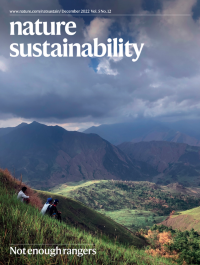Volume 5
-
No. 12 December 2022
Not enough rangersA few rangers who patrol over 1,000 km2 of Mount Iglit–Baco National Park on the Philippine Island of Mindoro, pictured, protect both its ecosystem and the territory of the Indigenous Taobuid people. Presenting the first global survey of protected area personnel, Appleton and colleagues find that the number of rangers and staffing available is far short of recommended guidance for effective management.
See Appleton et al.
-
No. 11 November 2022
Land use for net zeroA rethinking of the agricultural sector is now critical for many countries to reach net-zero emissions by 2050. In Ireland, Duffy et al. find that a reduction in meat and dairy production alongside smart land management can pave the way to achieving this goal. However, maintaining carbon neutrality beyond 2050 may prove more challenging.
See Duffy et al.
-
No. 10 October 2022
Complexities of water and conflictPopular conceptions of ‘water wars’ can lead to fears that water scarcity and water demand invariably lead to conflict over water resources. Rulli and colleagues examine a range of biophysical factors interconnecting with the socio-political context of the Lake Chad region of Africa and find that water does not lead directly to armed conflict but that it can increase complex tensions to prolong or escalate violence.
See Galli et al.
-
No. 9 September 2022
A history of sustainable intensificationIntensive crop–livestock systems are productive traditions with deep histories. The archaeological study by Yang and colleagues demonstrates intensification of a pig-and-millet system in North China, similar to the one pictured, where piles of livestock manure dot terraced fields before spring sowing.
See Yang et al.
-
No. 8 August 2022
Tracing urban gross polluting carsAlthough air pollution from private cars is substantial, estimates usually focus on only a few vehicles and miss the impact of the full driving cycle. Using GPS traces, Böhm and colleagues model emissions from thousands of private cars in three European cities and identify those responsible for the greatest quantity of emissions, as well as grossly polluted roads.
See Böhm et al.
-
No. 7 July 2022
Tuna trashNearly half of the debris from the tuna fishing industry in the Indian and Atlantic Oceans ends up being abandoned, lost or discarded at sea. By taking into account regional currents, Imzilen and colleagues find that a substantial portion of this pollution passes near major ports that can be staging grounds for coastal debris recovery.
See Imzilen et al.
-
No. 6 June 2022
Ultrafast desalinationFinding more efficient membranes for water desalination can increase the availability of clean water with reduced environmental impacts. Jiang and colleagues show that a membrane design based on a covalent organic framework can address the problem of low permeation flux and achieve ultrafast desalination.
See Wang et al.
-
No. 5 May 2022
Tropical forest carbon lossTropical forests store huge reserves of carbon but are under growing assault. Using satellite data, Zeng and colleagues show that annual carbon loss in tropical forests more than doubled between 2001 and 2019. Agricultural activities are driving most of this loss.
See Feng et al.
-
No. 4 April 2022
Aluminium demand of green powerDecarbonizing electricity production will require a dramatic scaling up of solar photovoltaic capacity. Lennon and colleagues detail what effect this ramp up of solar-powered electricity will have on global aluminium demand and the associated environmental risks.
See Lennon et al.
-
No. 3 March 2022
Greening batteriesThe rapid proliferation of batteries in a wide range of applications has put problems with their sustainability under greater public scrutiny. In this issue we highlight research on emerging cell chemistry and cathode materials that addresses the worrying reliance on lithium and cobalt, as well as a Review Article on sensing techniques to monitor the health of batteries for extended lifespan.
See Editorial
-
No. 2 February 2022
Western Indian Ocean coral reefs’ vulnerability assessedEcosystems worldwide are increasingly under threat. Obura and colleagues used a standardized method to assess the risk of collapse of coral reef ecosystems in the Western Indian Ocean (pictured).
See Obura et al.
-
No. 1 January 2022
Costs and benefits of the Great Green WallThe Great Green Wall programme aims to restore 100 million hectares of degraded ecosystems across various countries in the Sahel region (pictured). Mirzabaev and colleagues evaluated the economic costs and benefits of future land restoration projects under this programme.
See Mirzabaev et al.












